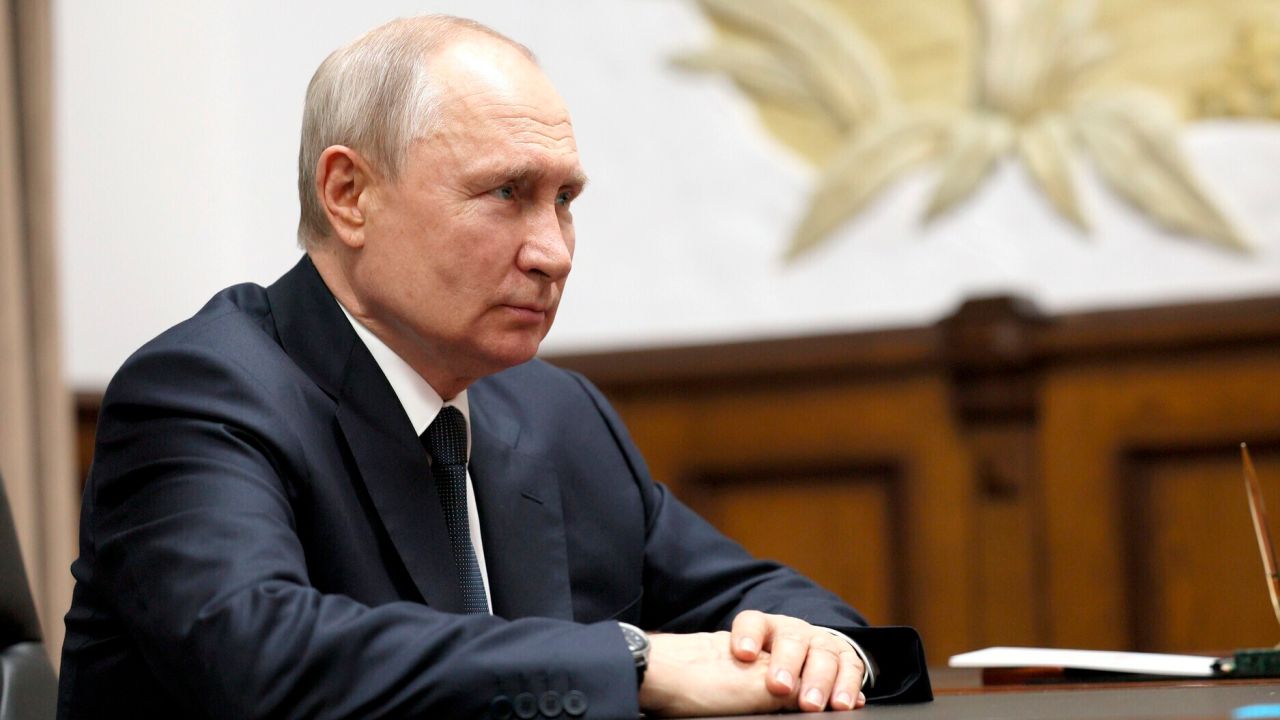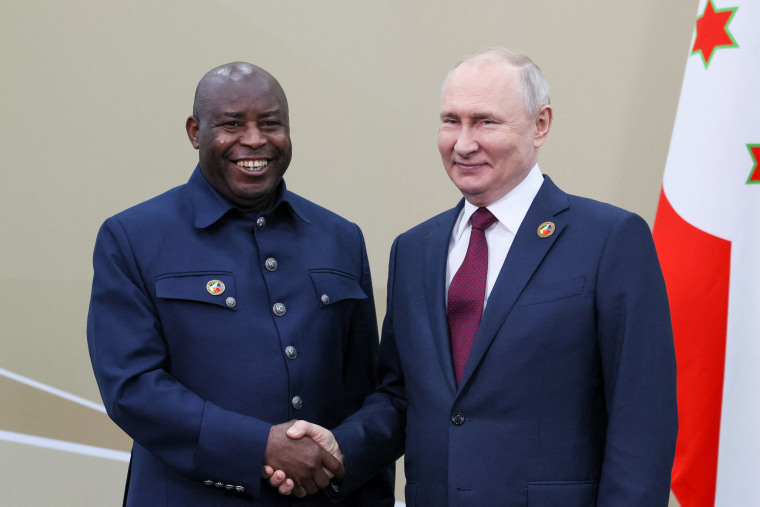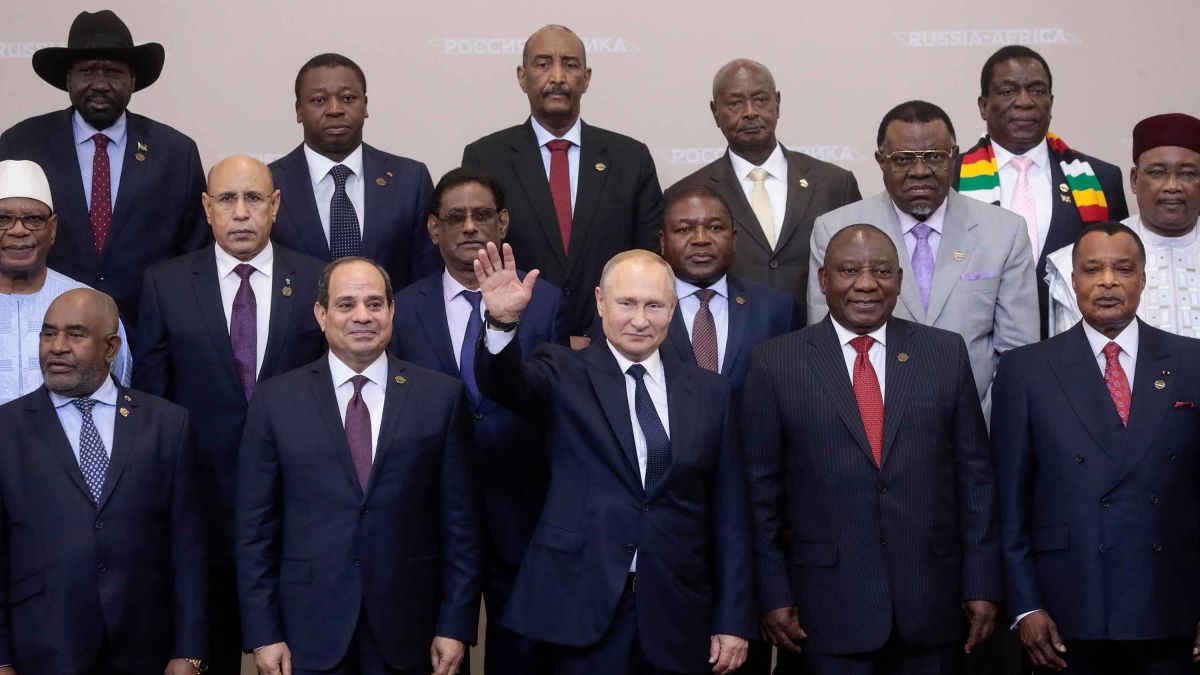Resolute Putin Engages Africa in Effort to Bolster Support Amid Kremlin Discontent Over Summit Turnout

Resolute Putin Engages Africa in Effort to Bolster Support Amid Kremlin Discontent Over Summit Turnout
In a determined display of diplomatic outreach, Russian President Vladimir Putin has embarked on a strategic mission to strengthen ties with African nations, seeking to secure their support in the midst of dissatisfaction back home. Putin’s ambitious efforts come as the Kremlin grapples with disappointment over the underwhelming attendance at a recent high-profile summit. The Russian leader’s tenacity in engaging with African leaders is emblematic of his unwavering commitment to fortify alliances on the international stage.

The summit in question, which was expected to be a grand display of global cooperation, saw a notable absence of several key world leaders. This development left the Kremlin seething with frustration, highlighting the need for Putin to look for new avenues of support and strengthen existing relationships. As Russia strives to maintain its influence in the world, the African continent presents a crucial opportunity for forging new partnerships and enhancing geopolitical significance.
The impetus behind Putin’s intensified outreach lies in the immense potential Africa holds in shaping the future of international relations. The continent’s vast resources, burgeoning economies, and growing political clout have not gone unnoticed by global powers, including Russia. While Russia has had historical ties with some African nations, the Kremlin now seeks to expand its influence across the entire continent, tapping into its economic prospects and solidifying diplomatic alliances.
President Putin’s recent diplomatic tour of African nations has witnessed a series of high-level meetings, bilateral agreements, and trade discussions. The Russian leader has personally engaged with African presidents and officials to explore mutual areas of interest and cooperation. These discussions span a wide range of sectors, including energy, infrastructure development, healthcare, education, and technology transfer.

One of the key areas of interest for both Russia and African nations is the energy sector. Russia, as a global energy powerhouse, is keen on exploring partnerships with African countries to tap into their abundant natural resources and expand its energy market. Simultaneously, many African nations are seeking foreign investment and expertise to develop their energy infrastructure, making Russia an attractive partner.
In addition to energy, Russia’s commitment to infrastructure development in Africa has been a focal point of discussions. Putin’s administration has pledged to support the construction of critical infrastructure projects such as roads, railways, and ports, with the aim of boosting economic growth and facilitating trade.
The health and education sectors have also emerged as potential areas of collaboration. Russia has a well-established reputation in medical research and education, and African countries are keen to benefit from Russian expertise to improve their healthcare systems and advance medical research. Similarly, Russian universities are increasingly becoming a destination of choice for African students seeking quality education in various disciplines.

Moreover, technology transfer is high on the agenda of Putin’s engagements with African nations. Russia, with its advanced technological capabilities, aims to collaborate with African countries to bridge the digital divide and foster innovation across the continent. By sharing technological knowledge and expertise, Russia hopes to play a pivotal role in Africa’s technological transformation.
Amid these diplomatic overtures, President Putin has also emphasized Russia’s commitment to fostering peace and stability in Africa. The continent has faced its share of challenges in the form of armed conflicts, terrorism, and geopolitical tensions. Russia, as a member of the United Nations Security Council and a prominent player in the global defense industry, is positioning itself as a potential partner for conflict resolution and security cooperation.
While Putin’s endeavors to shore up African support are apparent, the response from the continent’s leaders has been mixed. Some African nations have welcomed Russia’s outreach, seeing an opportunity for economic growth and diversification of international partners. Others, however, remain cautious, considering geopolitical complexities and potential implications on existing alliances.
Critics have also pointed to the issue of human rights and democratic values, raising concerns about Russia’s track record in these areas. As the African continent continues to evolve politically, there is a growing demand for accountable governance and respect for human rights. These aspects may influence the willingness of certain African countries to forge closer ties with Russia.
In conclusion, President Vladimir Putin’s ardent pursuit of support from African nations stands as a testament to Russia’s desire to bolster its presence on the world stage. The Kremlin’s discontent over the summit turnout has spurred Russia’s focus on diversifying its diplomatic efforts, with Africa being a crucial focal point. As Russia seeks to expand economic ties, build infrastructure, promote technological advancement, and project its influence, the response from African nations will determine the success of Putin’s endeavors in the continent. However, with geopolitical complexities and concerns over human rights, the path ahead for Russia-Africa relations remains both challenging and promising.



